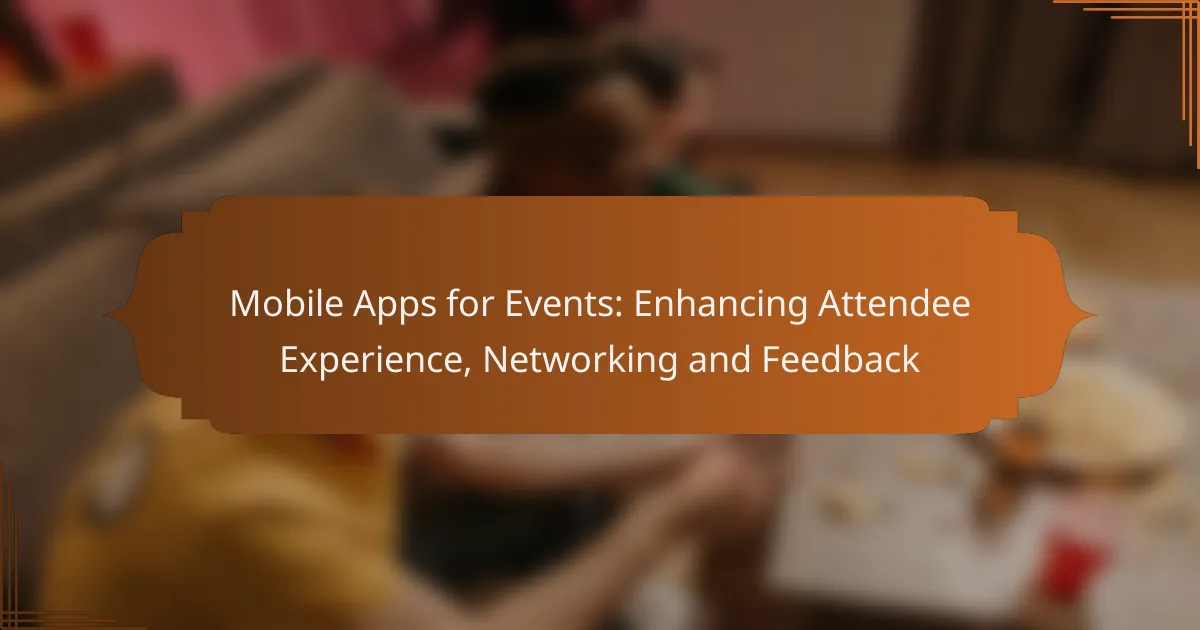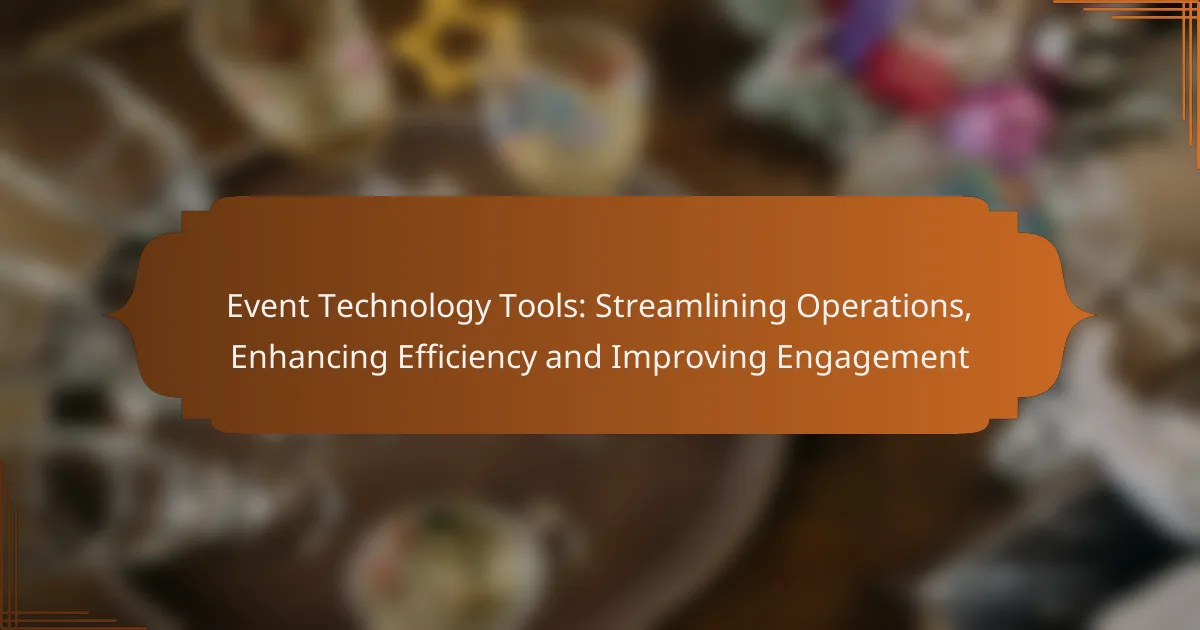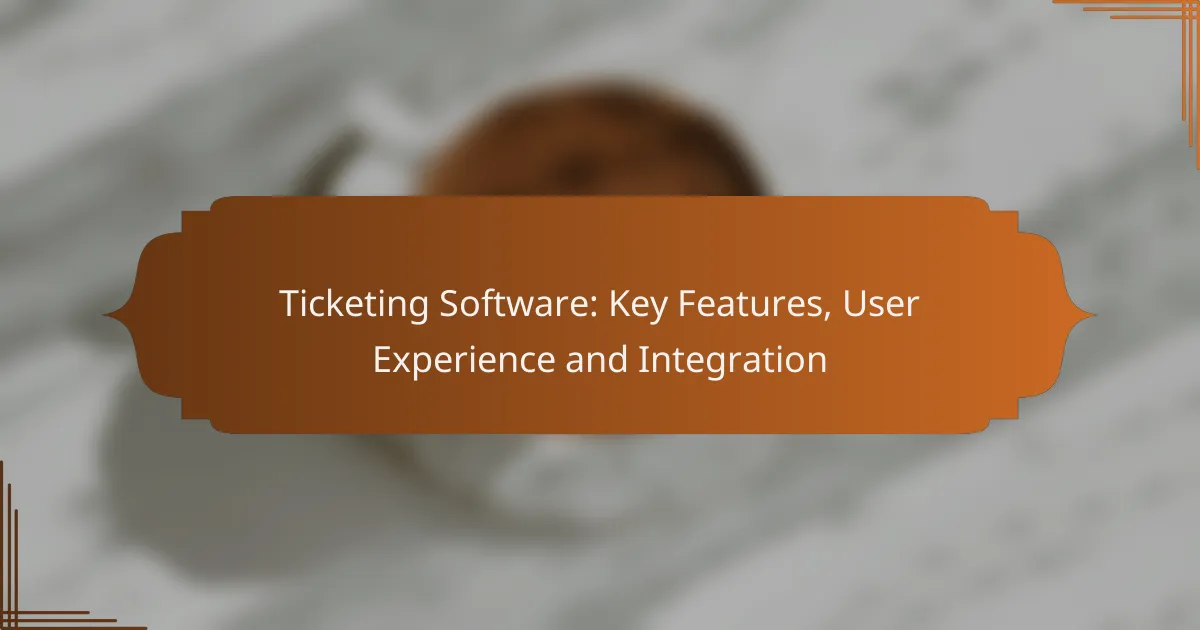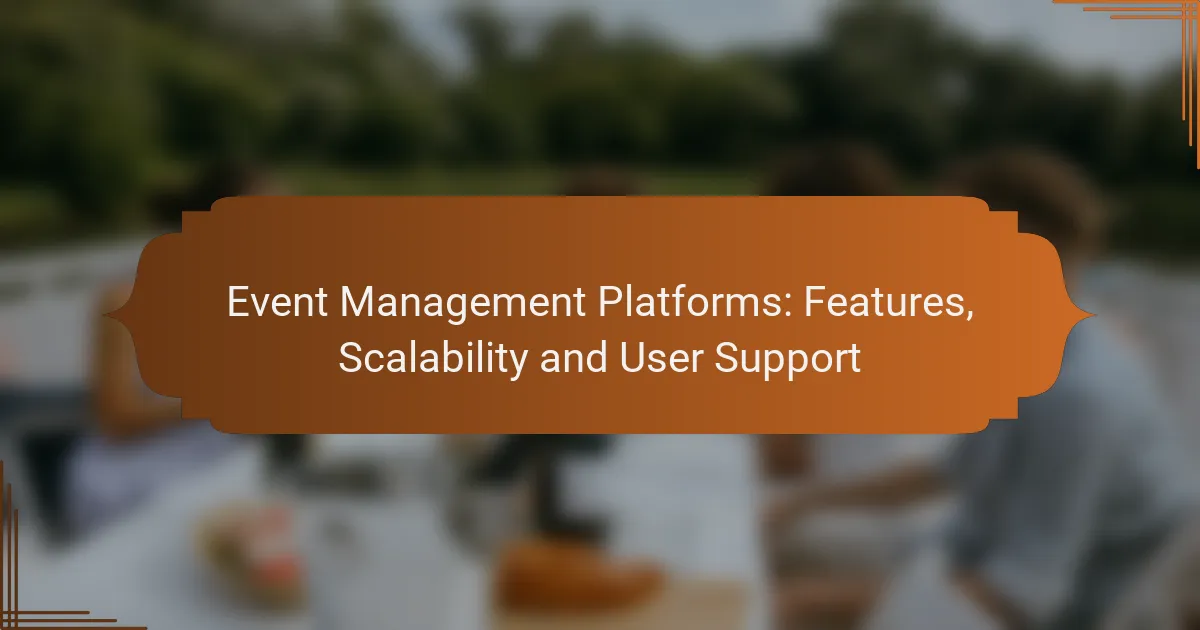Mobile apps have revolutionized the way attendees experience events by offering personalized features and real-time information that foster engagement and networking. These tools not only streamline communication but also enhance feedback collection, making events more enjoyable and efficient. When choosing an event app, it’s essential to focus on functionalities that promote attendee interaction and provide valuable insights.
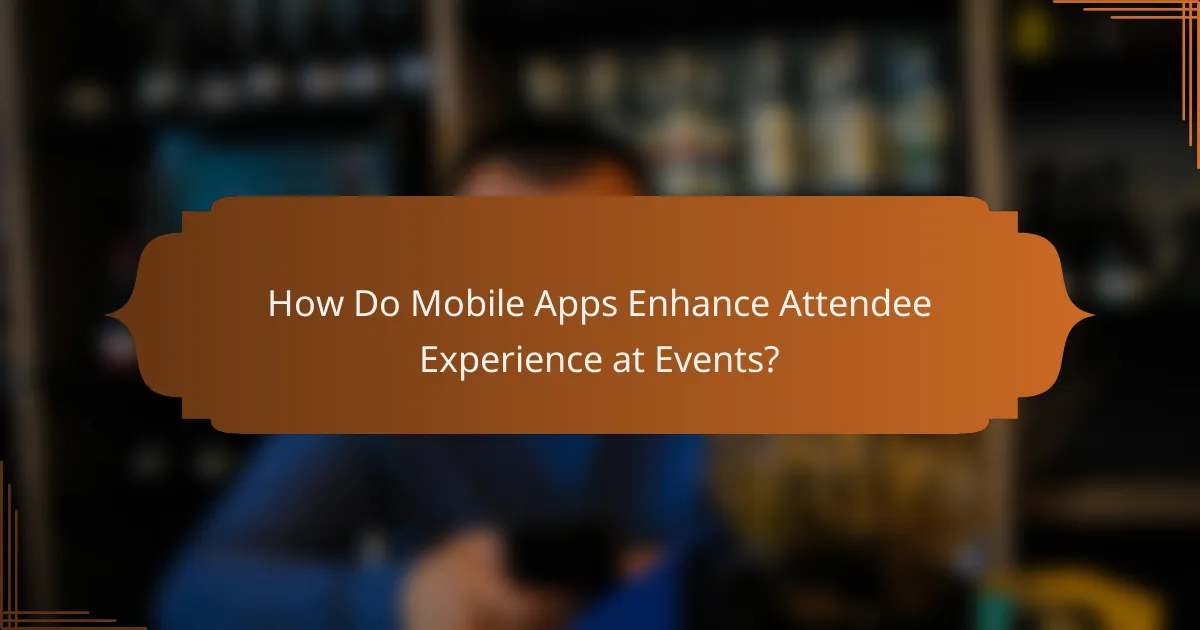
How Do Mobile Apps Enhance Attendee Experience at Events?
Mobile apps enhance attendee experience at events by providing personalized features, real-time information, and interactive tools that facilitate engagement and networking. These applications streamline communication and feedback, making events more enjoyable and efficient for participants.
Personalized agendas
Personalized agendas allow attendees to customize their event schedules based on interests and preferences. Users can select sessions, workshops, and networking opportunities that align with their goals, ensuring they maximize their time at the event.
For effective personalization, apps often use algorithms to suggest relevant sessions based on user profiles or past behavior. This feature not only helps attendees stay organized but also enhances their overall experience by focusing on what matters most to them.
Real-time updates
Real-time updates keep attendees informed about schedule changes, speaker announcements, and other important information. Notifications can be sent directly to participants’ devices, ensuring they never miss critical updates during the event.
These updates can include alerts for session start times, venue changes, or even emergency announcements. By providing immediate information, mobile apps help attendees navigate the event smoothly and reduce confusion.
Interactive maps
Interactive maps guide attendees through event venues, showcasing session locations, exhibitor booths, and amenities. These maps often feature zoom capabilities and clickable points of interest, making it easy for users to find their way around.
Some apps also include GPS functionality, allowing attendees to receive directions to specific locations within large venues. This feature is particularly beneficial for events held in expansive spaces, ensuring participants can quickly locate sessions and networking areas.
Gamification features
Gamification features engage attendees by incorporating game-like elements into the event experience. This can include point systems, leaderboards, and challenges that encourage participation in sessions and networking activities.
For example, attendees might earn points for attending workshops or visiting exhibitor booths, which can be redeemed for prizes. This approach not only makes the event more enjoyable but also fosters interaction among participants, enhancing networking opportunities.
Feedback collection
Feedback collection tools within mobile apps allow organizers to gather attendee insights quickly and efficiently. Users can provide ratings and comments on sessions, speakers, and overall event experiences through simple surveys or polls.
Collecting feedback in real-time helps organizers make immediate adjustments and improve future events. Additionally, it empowers attendees by giving them a voice in shaping the event experience, fostering a sense of community and involvement.
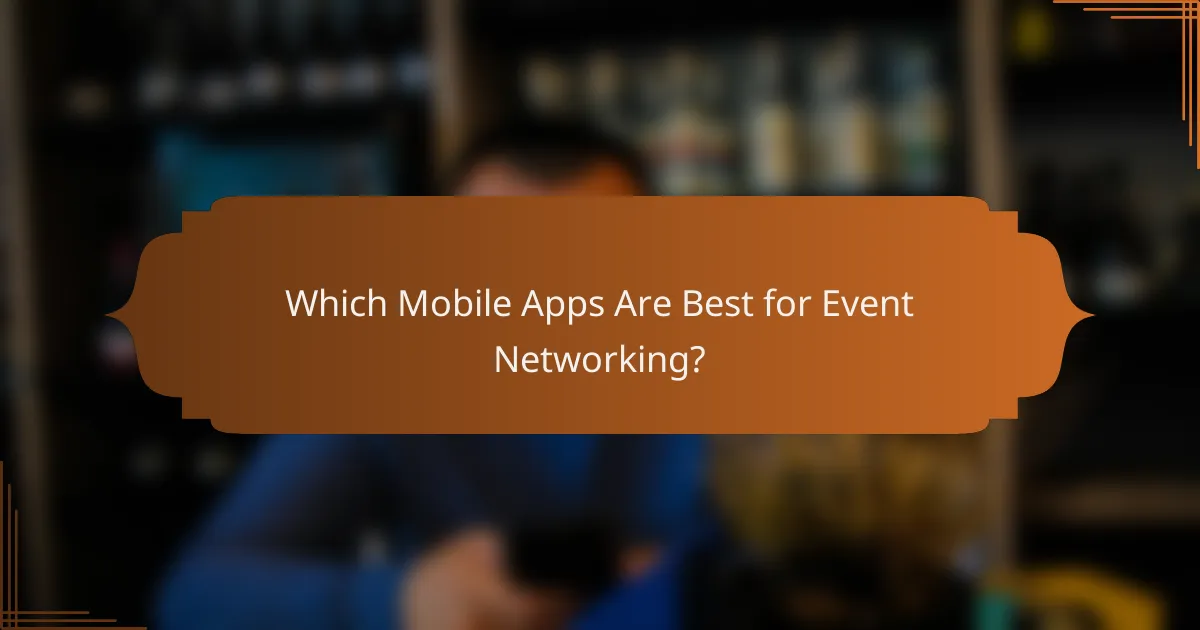
Which Mobile Apps Are Best for Event Networking?
Several mobile apps excel at enhancing event networking by facilitating connections among attendees, sharing information, and gathering feedback. The best options often depend on the type of event and specific networking needs.
Whova
Whova is a comprehensive event management app that significantly enhances networking opportunities. It allows attendees to create profiles, connect with others, and join discussions based on shared interests.
Key features include personalized agendas, attendee messaging, and a community board for sharing insights. Whova’s user-friendly interface makes it easy for participants to engage before, during, and after the event.
Eventbrite
Eventbrite is primarily known for ticketing but also offers networking features that can enhance attendee experiences. Users can browse events, purchase tickets, and connect with other attendees through the app.
With its integration of social media, Eventbrite allows users to share their attendance and invite friends, fostering a sense of community. However, its networking capabilities may not be as robust as dedicated networking apps.
Meetup
Meetup focuses on bringing people together based on shared interests, making it a great tool for networking at events. Users can join groups related to specific topics and attend meetups to connect with like-minded individuals.
This app encourages interaction by allowing users to RSVP to events and communicate with other attendees. Its community-driven approach can lead to meaningful connections, especially for informal gatherings.
LinkedIn Events
LinkedIn Events leverages the professional networking platform to facilitate connections among attendees. Users can create events, invite connections, and engage with participants through posts and comments.
This app is particularly useful for business-related events, as it allows attendees to view each other’s professional backgrounds. However, it may not be as effective for casual networking compared to other options.
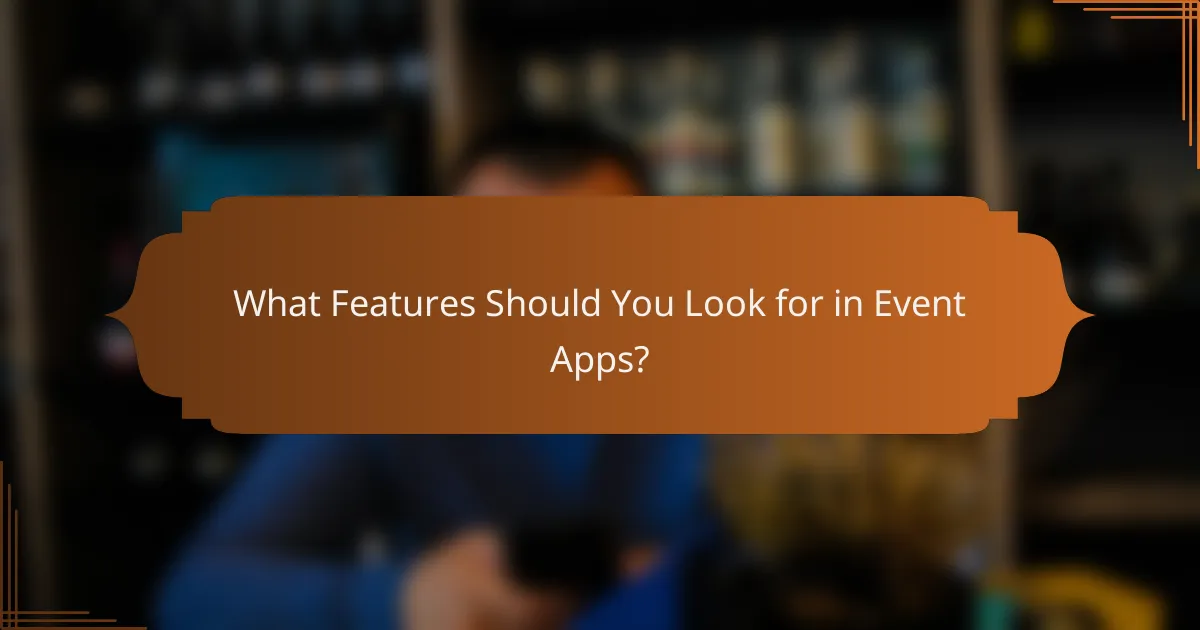
What Features Should You Look for in Event Apps?
When selecting an event app, prioritize features that enhance attendee engagement, facilitate networking, and provide valuable feedback mechanisms. Key functionalities include a user-friendly interface, effective networking tools, robust analytics, and seamless integration with other platforms.
User-friendly interface
A user-friendly interface is crucial for ensuring that attendees can navigate the app with ease. Look for apps that offer intuitive design, clear menus, and easy access to essential features like schedules and speaker information. The goal is to minimize the learning curve and maximize user engagement.
Consider apps that allow customization of the interface to match the event’s branding. This can enhance the overall experience and make the app feel more integrated into the event.
Networking tools
Effective networking tools are essential for fostering connections among attendees. Features such as attendee profiles, messaging systems, and meeting scheduling can significantly enhance interaction. Look for apps that allow users to connect based on shared interests or professional backgrounds.
Incorporating features like discussion forums or live Q&A sessions can also boost networking opportunities. These tools encourage attendees to engage not only with each other but also with speakers and sponsors, enriching the event experience.
Analytics and reporting
Analytics and reporting features provide insights into attendee behavior and engagement levels. Choose apps that offer metrics on session attendance, user interactions, and feedback submissions. This data can help organizers understand what worked well and what needs improvement for future events.
Look for real-time reporting capabilities that allow for quick adjustments during the event. This can help address any issues promptly and enhance overall attendee satisfaction.
Integration capabilities
Integration capabilities are vital for ensuring that the event app works seamlessly with other tools and platforms. Check if the app can integrate with registration systems, social media, and email marketing tools. This can streamline processes and enhance the user experience.
Consider apps that support API access, which allows for custom integrations tailored to specific needs. This flexibility can be particularly beneficial for larger events with unique requirements.
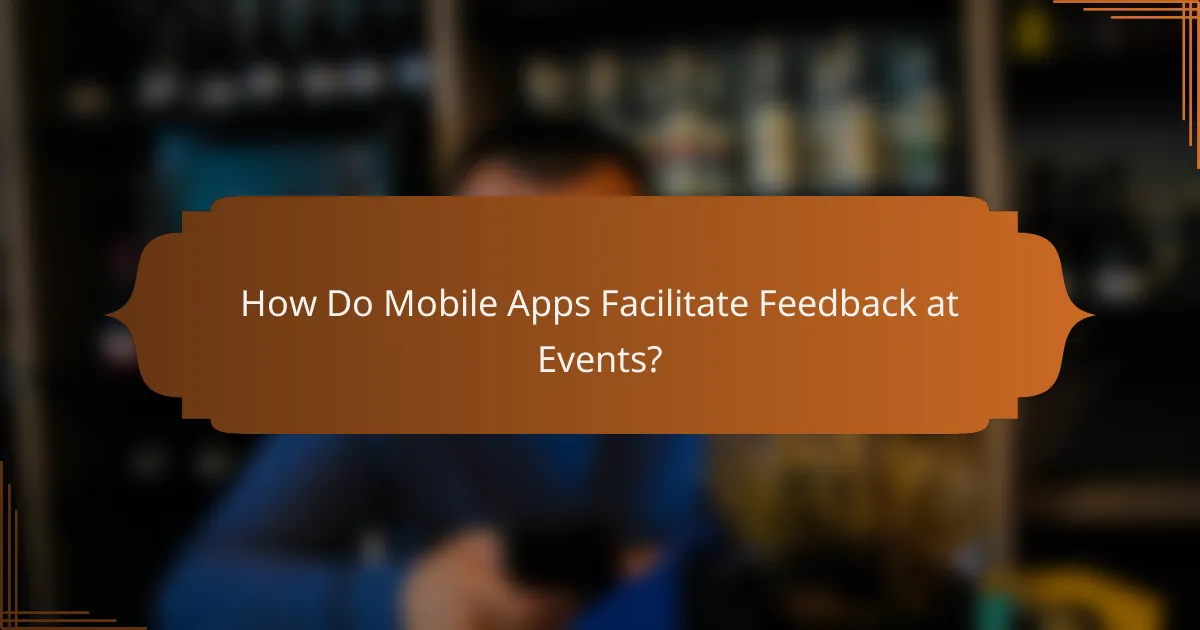
How Do Mobile Apps Facilitate Feedback at Events?
Mobile apps enhance feedback collection at events by providing real-time tools for attendees to express their opinions and experiences. These platforms streamline the process, making it easy for organizers to gather insights that can improve future events.
Surveys and polls
Surveys and polls within mobile apps allow event organizers to quickly gauge attendee satisfaction and preferences. By using simple multiple-choice questions or rating scales, organizers can gather feedback on various aspects, such as session quality, venue, and overall experience.
To maximize participation, consider sending push notifications during breaks or after sessions to encourage responses. Keep surveys short, ideally under five questions, to maintain engagement and increase completion rates.
Session ratings
Session ratings enable attendees to provide immediate feedback on individual presentations or workshops. This feature often includes a star rating system or thumbs up/down options, allowing for quick assessments of speaker effectiveness and content relevance.
Organizers can use this data to identify high-performing sessions and speakers, as well as areas needing improvement. Offering incentives, like entry into a prize draw for completing ratings, can further boost participation.
Live Q&A sessions
Live Q&A sessions facilitate direct interaction between attendees and speakers, enhancing engagement and feedback. Mobile apps can host these sessions, allowing participants to submit questions in real-time, which can be prioritized based on popularity or relevance.
To ensure a smooth experience, set clear guidelines for question submissions and time limits for responses. This approach not only fosters a dynamic discussion but also provides valuable insights into attendee interests and concerns.
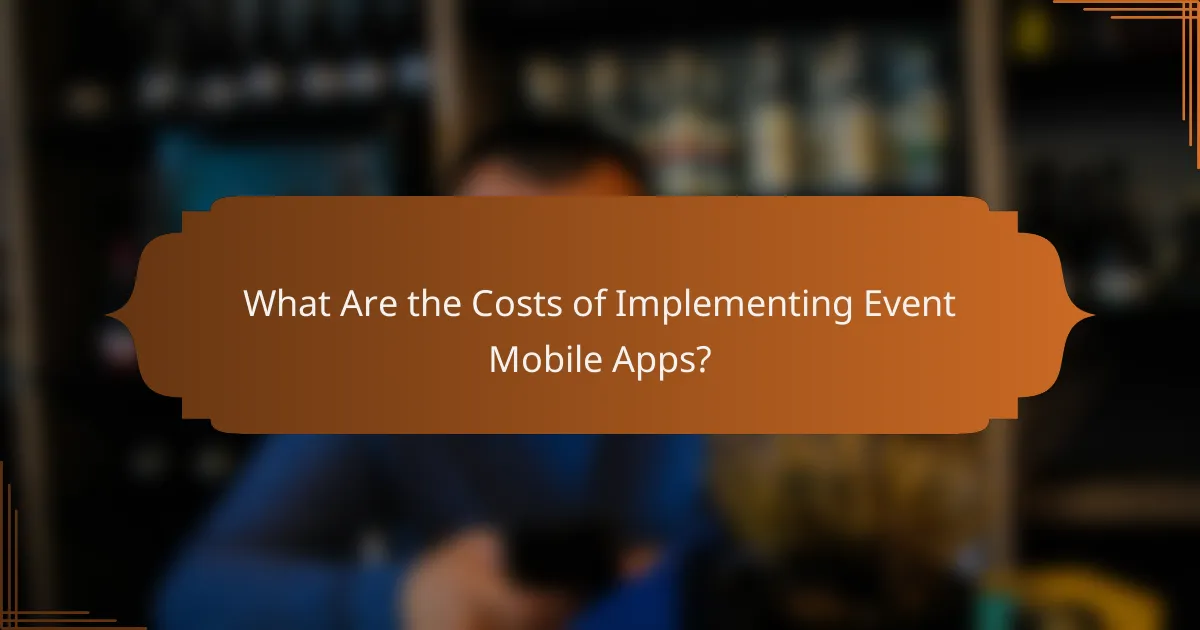
What Are the Costs of Implementing Event Mobile Apps?
The costs of implementing event mobile apps can vary significantly based on features, complexity, and the development approach. Generally, organizations should budget for both development costs and ongoing subscription fees to ensure a successful app launch and maintenance.
Development costs
Development costs for event mobile apps typically range from a few thousand to tens of thousands of dollars, depending on the app’s complexity and the platform chosen (iOS, Android, or both). Custom-built apps usually incur higher expenses compared to off-the-shelf solutions.
Key factors influencing development costs include design requirements, integration with existing systems, and the need for advanced features like real-time updates or networking capabilities. It’s essential to clearly define your app’s objectives to avoid unnecessary expenses.
Subscription fees
Subscription fees for event mobile apps can vary widely, often ranging from around $50 to several hundred dollars per month. These fees typically cover hosting, maintenance, and access to updates and support services.
When evaluating subscription options, consider the scale of your event and the features you need. Some platforms offer tiered pricing based on the number of users or events, allowing for flexibility as your needs change. Always read the fine print to understand what is included in the subscription and any potential additional costs.
